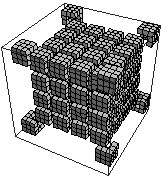This Discrete Universe:
Time Exposed via Computational Omniscience
Tuesday, June 20, 2006 → by Danieru

Just last week, a professor at the Massachusetts Institute of Technology named Seth Lloyd published a paper in Physical Review Letters estimating how many calculations the universe could have performed since the Big Bang — 10^120 operations on 10^90 bits of data, putting the mightiest supercomputer to shame. This grand computation essentially consists of subatomic particles ricocheting off one another and "calculating" where to go.Has the next great revolution in reality finally made itself known?
As the researcher Tommaso Toffoli mused back in 1984, "In a sense, nature has been continually computing the 'next state' of the universe for billions of years; all we have to do — and, actually, all we can do — is 'hitch a ride' on this huge ongoing computation."
This may seem like an odd way to think about cosmology. But some scientists find it no weirder than imagining that particles dutifully obey ethereal equations expressing the laws of physics. Last year Dr. Lloyd created a stir on Edge.org, a Web site devoted to discussions of cutting edge science, when he proposed "Lloyd's hypothesis": "Everything that's worth understanding about a complex system can be understood in terms of how it processes information."
Naturally a lot of researchers, who consider computers no more than useful tools, react huffily to the suggestion that what they are doing is "old science." So far no one using the alternative approach has been able to match the equations of calculus in predicting, for example, the exact moment of last week's solar eclipse for any spot on the planet.
What the detractors are less likely to emphasize is the track record of traditional mathematical methods in forecasting, say, the recent gyrations in the stock market or the way a forest fire will burn. Here the usual methods of science are stretched to the limit ・and that is where an influential minority of scientists quietly agree on the kind of cure Dr. Wolfram is so loudly prescribing: replacing equations with a different kind of mathematical device called algorithms, simple little computer programs....
....proposing that reality is not continuous but discrete, with a smallest possible length and a smallest possible duration of time. Picture space-time as a kind of grid on which the universe unfolds tick by tick, like a pattern in a kaleidoscope or a program running on a computer.
In expressing their awe at the mathematical nature of creation, physicists have playfully suggested that God is a mathematician. Why not make him a software engineer? The result, says Edward Fredkin, another early promoter of digital physics, "might be the beginnings of a new intellectual revolution comparable to what was spawned by the development of mathematics." - NyTimes & Edge
This new approach would seem to solve a problem which has been bothering me for a while. When the acceleration of a moving body X increases, so too does its mass. In tandem with this, any entity watching X accelerate would perceive time, in relation to X, begin to slow exponentially. This, very simply put, is Einstein's Special Theory of Relativity.
Looking sidelong at light it appears to us that time has slowed infinitely, meaning it does not exist. That is time does not pass - at all - for the beam/photons of light. Yet, if light could talk to us it would probably be too overwhelmed to speak, as the exact opposite is true. Light would perceive time in infinite extension - time is relative.
 Problem: Light exists everywhere simultaneously, yet it exists nowhere, nowhen, never...
Problem: Light exists everywhere simultaneously, yet it exists nowhere, nowhen, never...A conceptual explosion occurs for me right about here, but wait...
If the universe is computational, and therefore better modeled in discrete packets, then there is a minimum absolute length of time which can exist. This cancels out our view of light completely because at some stage our belief that time has slowed infinitely is off set by the absolute discreet packet of time. On the flip-side of this, if time has not compressed infinitely it cannot have dilated infinitely either. The universe is dragged back into consciousness, kicking and screaming as it comes.
Now, forgive my physics and maths heads here; I'm sure there are important aspects of this idea I am missing, but doesn't this view of reality fit better with common sense? It is not often than The Huge Entity grimaces in the face of Einstein, but today I find myself unable to hold back the slavering raspberry which pierces my lips.
What am I missing here? Surely I cocked up my workings somewhere along the way....
Categories: Science, Weird, Reality, Ideas, Maths, Reality, Universe, Perception, Time, History, Consciousness, Physics, Philosophy, Nonsense?
|
|

 Links
Links Subscribe via RSS!
Subscribe via RSS!


 Via Email
Via Email


If someone can prove that just ONE dimension in the universe is countable, then we've got ourselves a dilema: Free Will cannot exist.
Some of us have figured it out. It's f'n scary, man.
November 28, 2008 7:55 PM
Experiment: direct a beam of light and rotate it very slowly. Far away measure if light moves in steps. If so and it's impossible to direct light between these steps by adjusting the light emitter angle then this could prove that at least a part of universe is discrete if not all, and maybe even the universe "cell" size could be determined.
BTW, if universe would not be discrete then theoretically any amount of information could be stored between just 2 points (their distance).
December 06, 2009 7:17 PM
A countable numbers has the quality that it can be completely specified with a finite amount of information in a finite period of time. Uncountable numbers don't have this quality. So pi is a part of a countable set (Computable numbers) because a finite computer program can enumerate its infinite digits, and in enumerating all such finite computer programs, we come to pi. ANY number with a finite definition is countable, by enumerating all such definitions. Yet transfinite number theory states that the vast amount of real numbers, even on a finite interval, are uncountable, which is to say that they have infinite decimal places which are so random that they cannot be expressed (or compressed) into any finite expression, unlike numbers like pi and e which have finite definitions. So in other words it takes an infinite amount of information to precisely specify a given point on a real interval in the majority of cases.
So in using this to describe the universe, you have that classical "God doesn't play dice" view where an omniscient viewer (God) could tell you a particles position on its path at any moment of time. However even if an itsy bitsy particle where moving over an itsy bitsy interval, it would probably (2^aleph vs aleph) take an infinite amount of information to tell you where exactly where it is. Furthermore, in addition to having to know an INFINITE amount of information about a single particle at a moment in time, "God" would also have to know an infinite amount of information infinitely many times a second, just for one particle. What a pain in the ass for God!
I can't say for sure that this is not the case, but something about that deeply hints to me that the universe is discrete, call it a gut feeling.
May 03, 2010 10:55 PM
Post a Comment